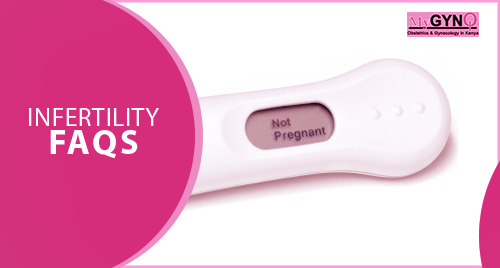- Clinic:
- 0733 945 717
- 0739 434 212

Pregnancy and martial arts training
May 22, 2024
When is fertility preservation necessary?
May 27, 2024Infertility: FAQs

How common is infertility?
Difficulty in conceiving is common, experienced by one in every six couples. This frequency increases with age, especially after the age of 35.How can I prevent myself from becoming infertile?
Some causes of infertility are not preventable. Here are several things you can do to maintain good fertility potential:- Avoid sexually transmitted infections (avoid multiple partners, use condoms, get screened and treated promptly if you contract an infection)
- Maintain a healthy weight by exercise and good diet
- Stop smoking and use of recreational drugs
- Beware of rapid decline in fertility after the age of 35
Should I take over the counter drugs to boost my fertility?
No. Fertility drugs should only be taken after a gynecological evaluation. The commonly prescribed clomid tablet is open to abuse, and prolonged use may cause serious risks that may include ovarian cancer. Please talk to your gynecologist before commencing on any fertility drugs.What tests should I have carried out if I am having problems conceiving?
Your medical evaluation will guide which tests are necessary. Some tests are expensive and should not be done routinely. Initial tests include assessment of sperms and confirmation of ovulation. In some cases a reproductive hormone profile is recommended. Further testing may involve assessing the fallopian tubes, uterus, ovaries and testes.What treatment options are available?
This will depend on the problems identified. Some couples will benefit from simple lifestyle modifications that include: stopping smoking and use of drugs, or simply losing weight.Additional interventions include use of fertility drugs to promote ovulation, insemination of sperms into the uterus and advanced reproductive techniques like ‘test-tube babies’ (IVF). A minority of women may benefit from surgery to correct fallopian tube problems.

